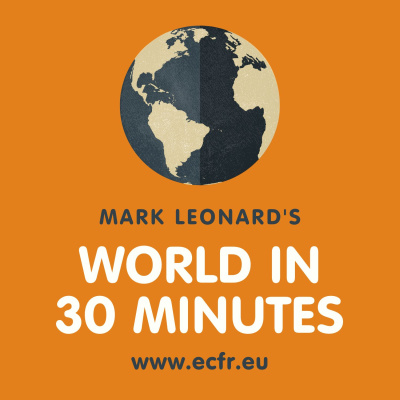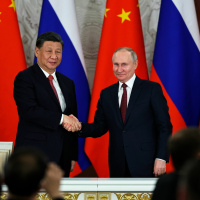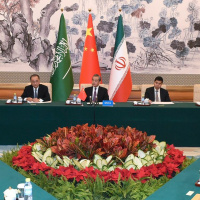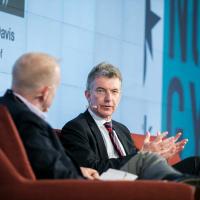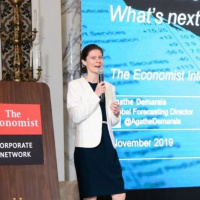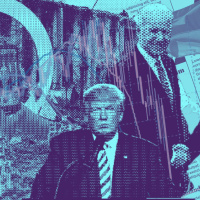Synopsis
Foreign policy podcasts hosted by Mark Leonard, Director of the European Council on Foreign Relations (ECFR), the first pan-European think-tank.
Episodes
-
Hungary’s strategy of connectivity
07/04/2023 Duration: 37minFrom the rise of China and Russia’s invasion of Ukraine to more independent middle and regional powers – our global political order is rapidly changing. But what is Hungary’s position in this increasingly multipolar world?In this week’s episode, Mark Leonard is joined by Balazs Orban, the political director of Hungarian prime minister Viktor Orban. (They are not related.) Balazs is also the chair of the board at the Mathias Corvinus Collegium and in 2021 wrote a book called “The Hungarian Way of Strategy”, in which he describes the country’s “strategy of connectivity”. How does the European Union fit into this vision? And what kind of relationship does Hungary expect to have with Russia when the war eventuallycomes to an end? This podcast was recorded on 20 March 2023. Bookshelf: The Hungarian Way of Strategy by Balázs Orbán Leadership: Six Studies in World Strategy by Henry Kissinger Nationale Interessen: Orientierung für deutsche und europäische Politik in Zeiten globaler Umbrüche by Klaus von Dohnanyi Hos
-
China and Russia: a friendship without limits
31/03/2023 Duration: 32minLast week, the Chinese leader Xi Jinping completed a three-day visit to Moscow, his first since Russia's full-scale invasion of Ukraine. Before the war, Xi and Vladimir Putin had famously announced a “friendship without limits”. But it is unclear whether that relationship is purely transactional, a marriage of convenience, or based on more fundamental, ideological factors. In this week’s episode, Mark Leonard is joined by the director of ECFR's Asia programme, Janka Oertel, and ECFR policy fellow, Alicja Bachulska, to discuss China-Russia relations. How best to explain the “friendship without limits”? What are the key takeaways from Xi's Russia trip? And how has Xi's embrace of Putin been perceived in central and eastern Europe? This podcast was recorded on 28 March 2023. Bookshelf: Our Share of Night: a novel by Mariana Enriquez Economists at War: how a handful of Economists helped win and lose the World Wars by Allan Bollard Hosted on Acast. See acast.com/privacy for more information.
-
The Iran-Saudi deal and its impact
24/03/2023 Duration: 34minLast week, China helped broker an agreement between long-feuding Saudi Arabia and Iran to begin the process of normalising their relations. Both the deal and China’s role surprised many observers – especially in the West. So, how significant is the agreement, and what consequences will it have for the Middle East? To address this and other questions, Mark Leonard welcomes Julien Barnes-Dacey, director of ECFR’s Middle East and North Africa programme; Cinzia Bianco, ECFR visiting fellow and Gulf expert; and Andrew Small, China expert and senior transatlantic fellow at the German Marshall Fund. Does this deal mean Beijing could play a constructive role in ending the war in Ukraine? Or should the United States be alarmed that China is encroaching on its traditional sphere of influence? This podcast was recorded on 22 March 2023. Bookshelf: Aftermath: Life in the Fallout of the Third Reich, 1945-1955 by Harald Jähner Berlin: The Story of a City by Barney White-Spunner Economists at War: How a Handful of Econo
-
German foreign policy with Christoph Heusgen
17/03/2023 Duration: 34minThis week, Mark Leonard welcomes Christoph Heusgen, longstanding foreign policy chief during the Merkel years and now chair of the Munich Security Conference. They discuss Western and non-Western reactions to the war in Ukraine – and, in particular, the role of Germany. Should Berlin have taken a harder line against Russia after 2014? How can Scholz realise his vision for the Zeitenwende? And what is stopping Germany from engaging more in developing countries? This podcast was recorded on 13 March 2023. Bookshelf: The Age of Unpeace: How Connectivity Causes Conflict by Mark Leonard Führung und Verantwortung: Angela Merkels Außenpolitik und Deutschlands künftige Rolle in der Welt by Christoph Heusgen Hosted on Acast. See acast.com/privacy for more information.
-
James O’Brien on sanctions
10/03/2023 Duration: 38minA year into the war in Ukraine, economic sanctions remain the West’s strongest instrument against Russia. But the Russian economy has proven surprisingly resilient: Russia still sells oil to Turkey and China, and – according to a recent investigation by The Economist and SourceMaterial – the Kremlin’s sanctions-dodging is becoming increasingly advanced. This week, Mark Leonard is joined by James O’Brien, head of the office of sanctions coordination at the US State Department, to discuss the efficacy of economic sanctions. What ripple effects have sanctions had for Western and third countries? Is the United States currently mulling sanctions against China? And what alternatives are there, if sanctions no longer work as intended?This podcast was recorded on 6 March 2023.Bookshelf-Backfire by Agathe Demarais-Russia’s sanctions-dodging is getting ever more sophisticated by The Economist and SourceMaterial -Talking to Terrorists by Jonathan Powell-We Don’t Know Ourselves by Fintan O’Toole-The Baseball 100 by Joe P
-
The crisis of democratic capitalism with Martin Wolf
03/03/2023 Duration: 33minSome analysts argue that capitalism would work better without democracy, while others believe that democracy would be better off without capitalism – so what’s the solution? In his new book “The crisis of democratic capitalism”, Martin Wolf, chief economics commentator at the Financial Times, sets out how they actually need one another if either is to thrive. In this week’s episode, host Mark Leonard welcomes Wolf to discuss what democratic capitalism is all about and how it is threatened by two distinct authoritarian versions of capitalism. What does all this mean for the development of democracy and capitalism in developing and emerging economies? And what are the chances that democratic capitalism will remain the model to which countries around the world aspire?This podcast was recorded on 10 February 2023. Bookshelf - The crisis of democratic capitalism by Martin Wolf - Slouching towards utopia by J. Bradford DeLong Hosted on Acast. See acast.com/privacy for more information.
-
United West, divided from the rest: Global public opinion one year into Russia’s war on Ukraine
24/02/2023 Duration: 32minA major new public opinion poll from ECFR indicates that, a year into Russia's war on Ukraine, the Western alliance is consolidating – but that there are divisions between the West and other global powers. These divergences range from their views of the conflict to their interpretations of democracy and their ambitions on the world stage. In this week's episode, the authors of the research – Mark Leonard, Timothy Garton Ash, and Ivan Krastev – discuss its main findings and the future of the world order. Does Europe have a strong role to play in a multipolar world, or will it forever live in the United States’ shadow? How can the West use the desire in emerging powers to act on their own terms to its advantage? And what principles should drive Europe’s engagement with those countries?This podcast was recorded on 18 February 2023.Further reading- United West, divided from the rest: Global public opinion one year into Russia’s war on Ukraine by Timothy Garton Ash, Ivan Krastev & Mark Leonard https://ecfr.eu
-
Live from the Munich Security Conference: Where is world politics turning?
20/02/2023 Duration: 27minRussia’s invasion of Ukraine upended many Western leaders’ previous assumptions about security policy, warfare, and the international order. Mark Leonard and his ECFR colleagues Camille Grand, Jana Puglierin, and Ulrike Franke got together at the Munich Security Conference (MSC) last weekend to discuss the dramatic changes – such as Germany's Zeitenwende – that have taken place as a result of these revisions. They analyse MSC speeches from Volodymir Zelensky, Olaf Scholz, and Emmanuel Macron, as well as the announcement of a plan for peace talks by China's top diplomat Wang Yi. What is on the transatlantic to-do list? And how can the West forge more and better alliances with countries in the global south? This podcast was recorded on 17 February 2023.Further reading: - The Munich Security Report 2023 Bookshelf: - Au café de la ville perdue [FR] by Anaïs Llobet - Les Loups [FR] by Benoît Vitkine Hosted on Acast. See acast.com/privacy for more information.
-
How Putin created the most threatening regime in the world – with Michael Thumann
10/02/2023 Duration: 31minThis week, Mark Leonard is joined by Michael Thumann, foreign affairs correspondent for the German weekly newspaper Die ZEIT, longtime expert on Russia, and one of the only German correspondents still reporting from Moscow. Following the publication of Thumann’s new book, “Revanche. Wie Putin das bedrohlichste Regime der Welt geschaffen hat” (“Revenge: How Putin created the most threatening regime in the world”, currently only available in German), he and Leonard discuss the roots of the Russian regime’s imperialistic behaviour. What is the relevance of Vladimir Putin’s interpretation of Russian history? Could Russia become a ‘normal country’ in the future? And how have Germans’ views of Russia changed since its full-scale invasion of Ukraine?This podcast was recorded on 1 February 2023.Further reading:- Revanche by Michael Thumann [available only in GER]: https://buff.ly/3lppnPn - The old is dying and the new cannot be born: A power audit of EU-Russia relations by Kadri Liik: https://t.co/W42ylXEfDp Bookshel
-
Agathe Demarais on sanctions as a foreign policy tool
03/02/2023 Duration: 30minOver the last decades, sanctions have become the West’s diplomatic tool par excellence. Faced with wars, humanitarian crises, and human rights violations, the West’s response has often been to impose sanctions to avoid resorting to military force. This week, Mark Leonard invited Agathe Demarais, global forecasting director of the Economist Intelligence Unit and author of “Backfire - How Sanctions Reshape the World Against US Interests”, to talk about how sanctions work and how they can be truly effective. Have the sanctions on Russia been successful? Is there a danger of the West becoming over-reliant on them? And will they eventually be replaced by other economic weapons?This podcast was recorded on 24 January 2023.Further reading-ECFR’s work on geo-economics: https://ecfr.eu/category/europeanpower/economic-sovereignty/ - Backfire: How Sanctions Reshape the World Against U.S. Interests by Agathe Demarais- The global race for semiconductor hegemony with Janka Oertel, Chris Miller and Andrew SmallBookshelf- Wh
-
The Leopards are free!
27/01/2023 Duration: 29minOn 25 January, after months of deliberation, Germany's chancellor Olaf Scholz announced he would send Leopard 2 tanks to Ukraine – and permit other countries to do the same. What led to this turnaround? Mark Leonard is joined by ECFR heavyweights on security and defence policy – Camille Grand, Gustav Gressel, Jana Puglierin, and Jeremy Shapiro – to discuss what this decision means for the war in Ukraine, for German diplomacy, and for transatlantic relations. Will the unity on show at last week's Ramstein meeting continue in the long term? And what is the future of military aid for Ukraine? This podcast was recorded on 25 January 2023. Further reading - The Leopard plan: How European tanks can help Ukraine take back its territory by Gustav Gressel, Rafael Loss and Jana Puglierin: https://t.co/2798lmtF1x - Send in the Leopards: Why Western allies should deliver tanks to Ukraine by Margaryta Khvostova & Dmytro Kryvosheiev: https://t.co/BV7Hs0TvYx Bookshelf:- Les Ambitions Inavouées by Thomas Gomart- Putin'
-
Davos world: Alexander Stubb and Mark Leonard live from the WEF
20/01/2023 Duration: 22minThis week’s episode comes to you all the way from the snowy peaks of Davos, Switzerland. Mark Leonard is joined by ECFR board member Alexander Stubb – who is director of the school of transnational governance at the European University Institute in Florence and a former prime minister of Finland – to give us their take on this year's World Economic Forum. What does cooperation in a fragmented world look like? Does the war in Ukraine still top the bill in every WEF session, and how do leaders discuss the energy crisis? Leonard and Stubb share their thoughts on all this and more, including the US Inflation Reduction Act, India’s role in the multipolar world, and Olaf Scholz’s speech. This podcast was recorded on 18 January 2023. Bookshelf:• Personality and Power: Builders and Destroyers of Modern Europe by Ian Kershaw• Leadership: Six Studies in World Strategy by Henry Kissinger Hosted on Acast. See acast.com/privacy for more information.
-
Catherine Ashton on 21st century diplomacy
13/01/2023 Duration: 35minIn this episode, Mark Leonard welcomes Catherine Ashton – the European Union’s first high representative for foreign affairs and security policy and the first female EU commissioner for trade – to talk about her new book “And Then What? Inside Stories of 21st Century Diplomacy”. As a seasoned mediator, Ashton played a crucial role in negotiating the ‘Brussels agreement’ between Serbia and Kosovo in 2013 and the Joint Plan of Action with Iran the same year. But what is her outlook on diplomacy today? How can diplomats lay the groundwork for success? Concerning Ukraine, what are the chances for diplomacy under such difficult global conditions? And what role should the United Kingdom play in future European and international relations? This podcast was recorded on 1o January 2023.Bookshelf:- And Then What? Inside Stories of 21st Century Diplomacy by Catherine Ashton - Never by Ken Follett - Leadership: Lessons from a Life in Diplomacy by Simon McDonald Hosted on Acast. See acast.com/privacy for more information
-
Top ten foreign policy trends for 2023
06/01/2023 Duration: 22minOur beloved predictions episode is back! As they do every year, Mark Leonard and ECFR research director Jeremy Shapiro forecast the foreign policy trends and events for the year ahead.If other analysts saw it coming, Mark and Jeremy certainly didn’t. Their 2022 prediction of “no large-scale Russian invasion of Ukraine” really threw last year’s scoring off leaving them with only 6/10 points. Will they do better this time? And what are your foreign policy predictions for 2023? Send us an email or tweet them to us using #Worldin30Minutes! This podcast was recorded on 4 January 2023.Further reading:2023: The year we learn to stop worrying by Mark Leonard & Jeremy ShapiroBookshelf:•Vladimir by Julia May Jonas•Anéantir by Michel Houellebecq•Exhalation by Ted Chiang Hosted on Acast. See acast.com/privacy for more information.
-
A battle on two fronts: Poland, Germany, and the rule of law
21/12/2022 Duration: 28minAfter the EU finally came to an agreement with Hungary over financial aid for Ukraine, all eyes are now on Poland and its own protracted conflict with Brussels over its rule-of-law inadequacies. Meanwhile, a series of public spats between Warsaw and Berlin has drawn attention to the rifts within the EU and a new East-West divide. In this week’s episode, Mark Leonard is joined by Piotr Buras and Jana Puglierin, heads of ECFR’s Warsaw and Berlin offices respectively and senior policy fellows. Together they talk about Poland’s standing within the EU and Polish-German relations. What is the state of the rule of law in Poland? How has the war in Ukraine affected Polish politics and Poland’s relationship to its neighbours and the EU? And finally, why does Poland have it out for Germany? This podcast was recorded on 16 December 2022. Further reading - “The final countdown: The EU, Poland, and the rule of law” by Piotr Buras: https://buff.ly/3WjF7k6 Bookshelf - “Spat Over Patriot Missiles Reveals Deepening Rifts in
-
Introducing: In:Sight China with Wang Jisi
16/12/2022 Duration: 26minNew mini-series! Subscribe here: https://soundcloud.com/ecfrclips China is becoming ever more important to global affairs. But the covid-19 pandemic, as well as political and geopolitical challenges, mean that Europeans’ ability to engage with Chinese thinkers and understand their views and ideas about the world has diminished. In this mini-series, Mark Leonard and Janka Oertel will try to change that by engaging in conversations with some of the best Chinese academics, researchers, writers, and journalists on diverse topics in Chinese internal debates that matter most to Europeans.In the first episode, the hosts are joined by Wang Jisi, the founding president of the Institute of International and Strategic Studies at Peking University and one of the world’s most prominent scholars on US-China relations. Together, we will learn about China’s understanding of global order and the recent developments in the geopolitical landscape with a focus on US-China. What can we take away from China’s stance at the G20 sum
-
Backsliding democracy: Zsuzsanna Szelenyi on Hungary
09/12/2022 Duration: 32minThe European Council is considering freezing €7.5 billion in funds allocated to Hungary due to concerns about rule of law violations. Meanwhile, prime minister Viktor Orban has embarked on a controversial “national consultation” concerning EU sanctions against Russia, increasingly isolating Hungary among member states. In this week’s podcast, Mark Leonard is joined by Zsuzsanna Szelenyi, a Hungarian politician and foreign policy specialist, to discuss the situation in the country. What would the freezing of EU-funds mean for Hungary-EU relations and Hungary’s role in the union? What new alliances is Orban trying to foster among other illiberal governments in Europe? And finally, how could Hungary’s confrontational approach to Brussels shape European foreign policy when it comes to Russia, and even China?This podcast was recorded on 7 December 2022.Bookshelf:• “Tainted Democracy: Victor Orbán and the Subversion of Hungary” by Zsuzsanna Szelényi• “Mind the gaps: The pending suspension of Hungary’s EU funds” by
-
Rethinking the purpose of AI with Stuart Russell
02/12/2022 Duration: 32minFrom search engines to social media, from navigation systems to medical gear, our everyday lives are already intertwined with artificial intelligence. But as AI becomes ever more powerful, questions around security risks, ethical use and disinformation arise. In this week’s episode, Mark Leonard is joined by Stuart Russell, professor of electrical engineering and computer sciences and holder of the Smith-Zadeh Chair in Engineering at the University of California at Berkeley. They discuss artificial intelligence’s capabilities to solve global problems and humans’ ability to control its dark side. What benefits can AI bring to health and education? How do algorithms foster extremism and the polarisation of public debates? And finally, could lethal autonomous weapons be ethically used? This podcast was recorded on 3 November 2022. Bookshelf: -“Superintelligence: Paths, Dangers, Strategies” by Nick Bostrom - “Life 3.0: Being Human in the Age of Artificial Intelligence” by Max Tegmark - “The Precipice: Existenti
-
The global race for semiconductor hegemony
25/11/2022 Duration: 39minThe semiconductor industry has become the cornerstone of the structure of the global economy and the balance of geopolitical power. And Europe has now joined the United States and China in a ‘chip war’ for global semiconductor domination.In this week’s episode, Janka Oertel, head of ECFR´s Asia programme and senior policy fellow, is joined by Chris Miller, assistant professor of international history at Tufts University, and Andrew Small, senior transatlantic fellow at the German Marshall Fund and ECFR alumnus. They discuss how chips decide power in today’s geopolitical competition. What role does Taiwan’s leadership in semiconductor production play in tensions with China? And to what extent will Europe align and integrate with the United States’ China policy in the upcoming years?This podcast was recorded on 16 November 2022.Bookshelf:•“Chip War: The Fight for the World's Most Critical Technology” by Chris Miller• “The Rupture: China and the Global Race for the Future” by Andrew Small - One of the FT Best Bo
-
The Clash of Orders with Comfort Ero on Nigeria
18/11/2022 Duration: 32minMany Europeans see the war in Ukraine as an attack on the ‘rules-based order’. But to many people in other parts of the world, there is no consensus on a set of rules to govern global affairs – and no sense of order. In this mini-series, Mark Leonard will go on an intellectual tour of the world, talking to key thinkers about how order is being defined by different powers. He explores how the clash between these different notions plays into the big shocks facing the world – from climate change and future pandemics to geopolitical struggles and technological disasters – and what this means for national and global politics.-----In this sixth instalment, Leonard is joined by Comfort Ero – president and CEO of the International Crisis Group – to learn more about the Nigerian perspective on global order. How can oil and gas output help Nigeria position itself advantageously in the context of the war in Ukraine? What role do African regionalism and Pax Africana play in building the continent’s capacity to respond to
